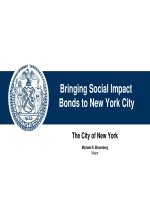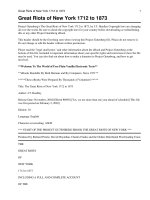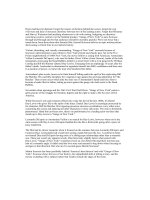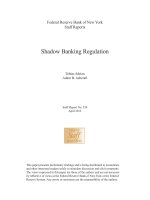gangs of new york
Bạn đang xem bản rút gọn của tài liệu. Xem và tải ngay bản đầy đủ của tài liệu tại đây (34.5 KB, 1 trang )
Hype machines be damned. Forget the rumors of derision behind the scenes, forget the cost
over-runs and lack of onscreen chemistry between two of the leading actors. Forget that Miramax
and Harvey Weinstein had anything whatsoever to do with cutting, budgeting or otherwise
exercising creative control over the finished product. "Gangs of New York" is pure Scorsese
through-and-through and for that audiences should be eternally grateful. We're not force-fed a
toned down, been-there-done-that formula film. Instead Scorsese delivers an epic motion picture
showcasing a critical time in our nation's history.
Violent, disturbing, and visually commanding, "Gangs of New York" succeeds because of
Scorsese's determination to pay tribute to New York's brutal and chaotic past. Set in the Five
Points neighborhood of 1860s New York, the movie follows a young Irish American, Amsterdam
Vallan (Leonardo DiCaprio), who sees his father, Priest Vallon (Liam Neeson), leader of the Irish
immigrants street gang the Dead Rabbits, killed in a street brawl with a rival gang led by William
Cutting aka Bill the Butcher (Daniel Day-Lewis). Emerging from an orphanage 16 years after his
father's death, Amsterdam is determined to ingratiate himself into Bill's confidence and then once
in a position of power, cut down the man who butchered his father.
Amsterdam's plan works, however he finds himself falling under the spell of the captivating Bill
the Butcher. His carefully laid plans for vengeance rage against his growing admiration for The
Butcher. Then events occur which take the onus out of Amsterdam's hands and force him to
become a leader like his father, taking up arms against the gangs who laid waste to the Dead
Rabbits.
Set amidst urban uprisings and the 1863 Civil War Draft Riots, "Gangs of New York" paints a
gritty picture of the struggle for freedom, dignity and the right to make a life for one's self in
America.
While Scorsese's sets and costumes effectively evoke the feel of the late 1800s, it's Daniel
Day-Lewis who gives life to the spirit of the times. Daniel Day-Lewis is seemingly possessed by
his character, Bill the Butcher. His imposing presence onscreen overshadows every other actor,
consuming the screen and reducing all other characters to mere side notes. The man is absolutely
phenomenal. Hand him an Oscar now, there's no performance by a leading actor out there that
stands up to Day-Lewis in "Gangs of New York."
Leonardo DiCaprio as Amsterdam Vallon is no match for Day-Lewis, however when not in the
same scenes with Day-Lewis, DiCaprio handled his role like a Rottweiler going after a piece of
juicy tenderloin.
The film had its slower moments when it focused on the romance between Leonardo DiCaprio and
Cameron Diaz. I personally had a hard time seeing a spark between the two. I could have better
envisioned Diaz and DiCaprio having more of a sibling-type relationship rather than a romantic
one. There just wasn't any apparent sizzle. Diaz fared only slightly better when paired with
Day-Lewis. "Gangs of New York" would have been an even better film had there not been any
hint of a romantic angle. It didn't need the love story and seemed to bog down when focusing its
energies in that direction. But who am I to second-guess Martin Scorsese?
Martin Scorsese has been justifiably labeled 'America's best director' and with "Gangs of New
York," Scorsese shows his love of our history, his unparalleled skill at telling a story, and his
moxey at dealing with a subject matter that resides outside the edges of the norm.









